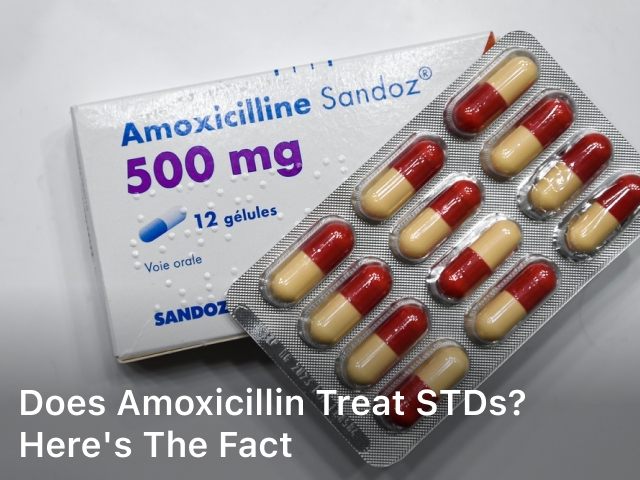Does Amoxicillin Treat STDs? Here’s The Fact

nutrivitalhealth.com. Does Amoxicillin Treat STDs? Here’s The Fact – Discover the truth about using Amoxicillin to treat STDs. This comprehensive article answers your questions and provides expert insights.
Amoxicillin, a commonly prescribed antibiotic, has sparked curiosity regarding its efficacy in treating sexually transmitted diseases (STDs). In this informative article, we delve deep into the topic, separating facts from myths. So, does Amoxicillin treat STDs? Let’s explore the truth.
The Mechanism of Amoxicillin
Before we discuss its role in treating STDs, let’s understand how Amoxicillin works.
Amoxicillin is a versatile antibiotic that belongs to the penicillin class. It operates by inhibiting the growth of bacteria. Specifically, it targets the cell walls of bacteria, weakening them and ultimately leading to their destruction. This mechanism makes Amoxicillin effective against various bacterial infections.
The Role of Amoxicillin in Treating STDs
Now, let’s address the burning question: Can Amoxicillin treat STDs?
Chlamydia and Gonorrhea
Amoxicillin can indeed be used to treat certain STDs. For instance, it is effective against Chlamydia and Gonorrhea, two common bacterial infections that are transmitted sexually. Doctors may prescribe Amoxicillin as a first-line treatment for these infections. However, it’s crucial to follow the prescribed dosage and complete the entire course to ensure the infection is eradicated.
Syphilis
Amoxicillin can also play a role in treating early-stage syphilis. It is typically administered in combination with other antibiotics for optimal results. However, for late-stage syphilis, different antibiotics are usually recommended.
Not Effective for Viral STDs
It’s essential to note that Amoxicillin is ineffective against viral STDs, such as HIV, herpes, and hepatitis. Viral infections require antiviral medications specifically designed to target viruses.

Can Amoxicillin cure STD infection?
Amoxicillin is not typically used to cure sexually transmitted infections (STIs) such as chlamydia, gonorrhea, or syphilis. While amoxicillin is an antibiotic that can treat a wide range of bacterial infections, it may not be effective against the specific bacteria that cause these STIs.
The recommended treatment for STIs often involves other antibiotics that are specifically targeted at the bacteria responsible for the infection. It is essential to consult a healthcare professional for proper diagnosis and treatment if you suspect you have an STI. They can prescribe the appropriate antibiotics or medications based on the specific infection and its antibiotic susceptibility.
Additionally, it’s crucial to complete the full course of prescribed antibiotics and follow any other instructions provided by your healthcare provider to ensure that the infection is properly treated and to prevent its spread to others. Safe sexual practices, such as using condoms, are also important for preventing the transmission of STIs.
Can Amoxicillin 500mg treat syphilis?
Amoxicillin is not the preferred or recommended treatment for syphilis. Syphilis is a sexually transmitted infection (STI) caused by the bacterium Treponema pallidum. The treatment of syphilis typically involves the use of antibiotics, but the choice of antibiotic and dosage depends on the stage of the infection.
For early stages of syphilis (primary, secondary, and early latent syphilis), the preferred treatment is usually a single injection of the antibiotic benzathine penicillin G (also known as Bicillin L-A). For more advanced stages of syphilis or when the infection has been present for an extended period, a longer course of treatment with penicillin or other antibiotics may be required.
Amoxicillin, while an antibiotic in the penicillin family, is generally not used as the first-line treatment for syphilis due to concerns about its effectiveness against Treponema pallidum and the development of antibiotic resistance.
It is crucial to consult a healthcare professional for proper diagnosis and treatment if you suspect you have syphilis or any other sexually transmitted infection. They can provide you with the appropriate antibiotics and treatment regimen based on your specific condition and its stage.
Keep Reading : Does Hand Sanitizer Kill STDs?
FAQs
Q: Can I take Amoxicillin without a prescription?
A: No, it’s crucial to obtain a prescription from a healthcare professional before taking Amoxicillin. Self-medication can be dangerous and ineffective.
Q: Are there any side effects of using Amoxicillin for STDs?
A: Like any medication, Amoxicillin may have side effects, including nausea, diarrhea, or allergic reactions. Consult your healthcare provider if you experience any adverse effects.
Q: Can I drink alcohol while taking Amoxicillin for an STD?
A: It’s advisable to avoid alcohol while on Amoxicillin, as it can diminish the antibiotic’s effectiveness and exacerbate side effects.
Q: How long does it take for Amoxicillin to work on STDs?
A: The duration varies depending on the specific STD. Typically, improvements are seen within a few days, but it’s crucial to complete the entire course as prescribed.
Q: Can Amoxicillin cure all STDs?
A: No, Amoxicillin can only treat bacterial STDs. It is ineffective against viral STDs.
Q: Is it safe to engage in sexual activity while on Amoxicillin treatment?
A: It’s advisable to abstain from sexual activity until the entire course of antibiotics is completed, and the infection is confirmed to be cured.
Conclusion
In conclusion, Amoxicillin can effectively treat certain bacterial STDs like Chlamydia, Gonorrhea, and early-stage syphilis when prescribed by a healthcare professional.
However, it is essential to remember that it is not a one-size-fits-all solution for all STDs, as it is ineffective against viral infections. Always seek medical advice and follow your doctor’s instructions when dealing with STDs or any health concerns.
Remember, your health is paramount, and timely and appropriate treatment is crucial. If you suspect you have an STD, consult a healthcare provider for proper diagnosis and treatment.
